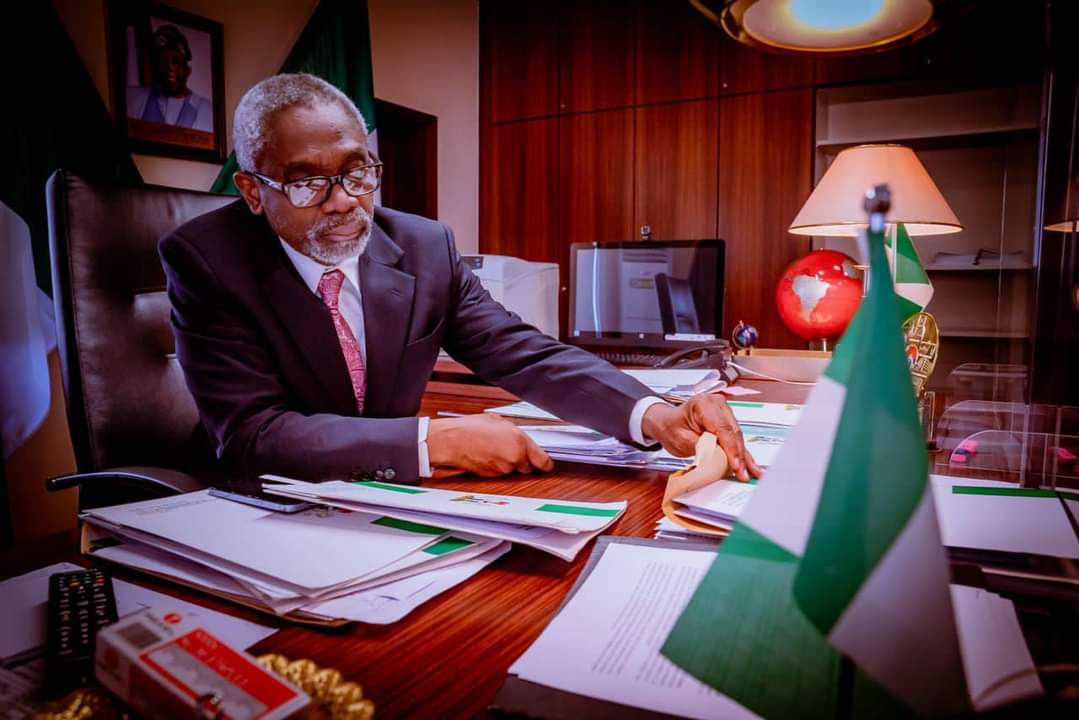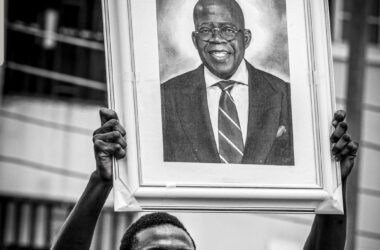From all indications, the Rt. Hon. Olufemi Hakeem Gbajabiamila, the lawyer, politician and immediate past Speaker of Nigeria’s House of Representatives is fast learning (in the months since assuming office as the Chief of Staff to President Bola Ahmed Tinubu) the unsavory truth of Kaitlyn Schiess’ famous assertion that “Proximity to power is its own kind of education. It shapes who you are and what you desire in life. A thirst for political power – and sometimes, obtaining that power – begets more than corruption. It often involves … degraded moral judgment and malpractice. Power never affects just one area of people’s lives … And it never affects just those individuals.”
By virtue of the job he has taken on, Hon. Gbajabiamila (or Gbaja, as his friends, political supporters and constituents like to call him) is in the eye of a storm. While it remains to be seen whether this storm will in time escalate into a political tsunami or is merely a storm in a teacup destined to fizzle out within days or weeks as the Tinubu Administration settles into a governing routine, there’s no doubt that a storm it is. To be sure, this is not a storm of Gbaja’s own making; it is simply the nature of the job. The of Chief of Staff to the President is invariably the focus of no small amount of palace intrigue, regardless of the jurisdiction, or the political affiliation or personal character and inclinations of the principal (whether President, Prime Minister or Monarch). And the intrigues surrounding the office are not so much a product of the COS’ job description (ie what he does during the course of a normal work day) as what he does behind the scenes.
Apart from his primary duty, which is to act as the principal aide and advisor to the President, the COS serves as a key liaison between his principal and other government officials, political leaders, and other stakeholders. He is also responsible for managing the President’s schedule, coordinating meetings, and ensuring efficient communication between various departments and agencies of government. In playing these roles and providing strategic guidance to the President, he plays a vital role in facilitating decision-making processes. Often regarded as the gatekeeper to the President, the COS controls access to the highest levels of power. The COS, along with his team, is also involved in crafting and implementing strategies to achieve the President’s goals and objectives. Through his proximity to the President, he has the ability to provide valuable insights, advice, and guidance on matters of governance and public policy.Although, of course he does not hold direct constitutional (ie elective) powers, his influence and impact on decision-making processes cannot be underestimated. He possesses the authority to shape the President’s agenda, influence policy formulation, and recommend suitable candidates for key positions within the administration.
In the years when Nigeria was under military rule, the COS’ office either did not exist, or was subsumed under its military equivalent, but since the advent of civil rule in Nigeria in 1999, the office of the COS has grown in scope and importance with each successive administration and with it the ability of the office-holder to either wave it like Harry Potter’s magic wand and conjure positive outcomes for those in his good books – or wield it like the proverbial Sword of Damocles over the heads of those who fall foul of him. The first COS during this dispensation was Abdullahi Mohammed, who served under President Olusegun Obasanjo for 8 years, and for about a further year under his successor, President Umaru Musa Yar’Adua. Mohammed was succeeded by Gbolade Osinowo. Osinowo’s stewardship was short-lived as President Yar’Adua eventually dispensed of the office in September of 2008. Following Yar’Adua’s passing in 2010, President Goodluck Jonathan brought the office back into political reckoning with his appointment of former Edo State deputy-governor Mike Ogiadomhe as COS. Ogiadomhe was replaced by retired Brigadier–General Jones Arogbofa, who served until Jonathan’s exit from power in 2015. President Muhammadu Buhari’s COS, Mallam Abba Kyari served from 2015 until his death in 2020. His replacement, Dr. Ibrahim Gambari was for many years Nigeria’s Permanent Representative at the United Nations Headquarters. His exit at the end of the Buhari Administration paved the way for Gbajabiamila’s appointment as COS by President Tinubu on June 14, 2023.
As mentioned earlier, one of the COS’ roles is to recommend suitable candidates for key positions within the administration. With the administration still in its formative stage, this particular role seems to have set Gbaja on a collision course with a number of leading stakeholders, especially within the ranks of the ruling All Progressives Congress (APC). In the formative period of any administration, lobbying for positions in the government usually gets more and more intense by the day as the new leader struggles to put his administration together, and it is natural for some stakeholders to feel what they perhaps see as a justified sense of entitlement based on their contributions to the party in general, or to the leader’s (in this case, Asiwaju Tinubu’s) emergence in particular. It is also natural for such stakeholders to feel disappointed, even betrayed, if they – or their candidate for appointment – do not get the President’s nod.
In such a scenario, they must find someone to blame for the setback – and in most cases, the lightning rod is usually … you guessed it, the Chief of Staff. Where the Chief of Staff’s power is overweening and obvious rather than subtle – as in the case to the late Abba Kyari, to whom President Buhari at one time referred almost everything pertaining to the Presidency and its range of powers – then he is the subject of the most intense kind of palace intrigues.
One dictionary source defines ‘palace intrigue’ as a situation in which powerful individuals within an organization are working against each other in order to secure a particular advantage. An inevitable feature of palace intrigues – as the aforementioned Chiefs of Staff, and perhaps Gbaja himself now can testify, having sat on these – are conspiracy theories. In the case of Gbaja, the conspiracy theories have to do with his alleged relationship with other members of the President’s kitchen cabinet, apparently over who has the President’s ear, and even who has a headstart ahead of the time in the near or distant future when the President would depart the scene.
According to these theories, the present intrigues have to do with Gbaja’s role in how the battle (for battle it is, like it or not) for ministerial slots is playing out at both the national and subnational levels. Recall that there was intense in-fighting in certain state chapters of the All Progressives Congress, APC, as governors, former governors and party leaders are battling to ensure that their respective factions are the ones who get to present said slots to President Tinubu. Most vehement in pressing their claims to ministerial slots are those APC stakeholders who argue that they had worked for the President during the February 25 presidential election. Inside sources even say that these intrigues are not limited to the APC; even some leaders of the political opposition, notably the People’s Democratic Party (PDP) and the New Nigeria People’s Party (NNPP) are also reportedly jostling to make list – apparently encouraged by the President’s declaration of his intention to set up a Government of National Unity.
But by the most serious (some would say insidious) charge against Gbaja, according to the conspiracy narrative currently making the rounds in those rarefied circles, has him – along with the National Security Adviser and former Chairman of the , Mallam Nuhu Ribadu at the head of a brand new cabal in Aso Rock, which the progagators of this theory brand as a vicious, corrupt and power hungry group hell-bent on positioning itself in readiness for the next election cycle in 2027, or any eventuality before then. To this end, the theory says, the Gbaja-Ribadu tag team has not taken complete control of the affairs of Government, it has also gone to great lengths to shield President Tinubu from all the happenings around him. This tag team, the conspirators say, would rather sacrifice the overall interest of the APC for its own.
With remarkable gifts of clairvoyance, the theorists – who apparently know the inner workings of the mind of the Chief of Staff and his alledged co-conspirators – say that Gbajabiamila clearly does not see Tinubu either completing his tenure, or having the capacity to run again in 2027 due to his failing health. So in order to consolidate his position, Gbaja is perfecting his strategy to clip the wings of prospective obstacles 2027 ambition (ie joining with Ribadu on a putative presidential ticket, or replacing Tinubu himself before the next polls and making Ribadu his No. 2).
According to these clairvoyant theorists, the Gbaja-led cabal has its sights on ex-Governor of Kaduna State, Nasir el-Rufai, whom they see as one of the most likely prospects in the event of the North having another shot at the Presidency. That, they say, explains their strenuous effort to exclude el-Rufai from the Tinubu ministerial list, in a bid to deny him a possible foothold ahead of 2027.
Same, they say, goes for all major stakeholders and party chieftains at both national and subnational levels, who had hitherto rested in the assurance that they had a place on that coveted list – by virtue of having toiled so hard for Tinubu’s victory. Such eager expectation, they say,has turned to palpable anger and the ascendancy of emotions, sentiments and even tendencies capable of tearing apart the fabric of the APC.
These conspiracy theorists even have a laundry list of the alleged victims of the unholy Gbaja-Ribadu alliance – ranging from the likes of Sen. Habu Ibrahim,n Katsina State, a close ally of Tinubu from Katsina State, who did not make the Ministerial list and no longer has his previously unfettered access to the President; to former Governor Aminu Bello Masari of the same Katsina State; to other former Ekiti Governors Kayode Fayemi of Ekiti State and Ayo Fayose (who, inspite of being from the opposition, has an arrangement with Tinubu). Erstwhile Lagos State Governors Babatunde Fashola and Akinwunmi Ambode, as well as ace broadcaster-turned politician, Mrs. Abike Dabiri also make up the list of victims, according to this theory, as are former Enugu State Governors Chimaraoke Nnamani and Ifeanyi Ugwuanyi – who had crossed party lines to work for Tinubu. The seemingly endless list of spurned ministerial hopefuls, according to the theory, runs across the length and breath of the country – from Teslim Folarin in Oyo to Magnus Abe in Rivers to Ebitimi Ambare in Bayelsa to Tunde Rahman and Bayo Onanuga in Lagos, even to ubiquitous party figures Femi Fani-Kayode, Tunji Bello, Babatunde Ogala, Ahmed Raji, Hon. Abiodun Faleke, Sen. Tokunbo Abiru and others.
Thanks to his elaborate scheming, Gbaja’s detractors say, his relationship with the Secretary to the Government of the Federation, Sen. George Akume has hit the rocks, apparently because of Gbaja’s tendency to encroach on the territory of the former Benue Governor, and to want to run the show in the Presidency all by himself.
The trouble with the Gbaja-Ribadu presidential story, and the lengths to which they say the COS has goneake it a reality, is one nagging question: What happens to a certain Kashim Shettima, who – if the Nigerian Constitution is anything to go by – ought to be next in line to the Presidency in the unlikely event that Tinubu fails to finish his current tenure. Either the conspiracy theorists are spectacularly ignorant about the provisions of that document, or, more likely, they are so carried away with their narrative that they simply failed to tie up that loose end.
If false, then, what could be the object of this power-play narrative? To create disaffection between the President and the former House Speaker, and perhaps lead to the latter’s dismissal as COS? Or simply to make his seat that little bit hotter and less comfortable, in a bid to bend his will andfact, that make him more to their will? Or simply to project every downturn in their political fortunes onto him, whenever they feel mostly keenly aware of their relative helplessness in the grand scheme of things as directed by powerful and increasingly inaccessible President?
It is early days yet in the life of this administration, and these sorts of rumblings in the corridors of power, or even in the workings of the ruling party – are an ill wind that will blow nobody any good. As Nigeria grapples with unprecedented challenges, it will be best for these entitled conspiracy peddlers to set aside their narrow intesrests aside for once and allow Hon. Femi Gbajabiamila to focus on his job of helping the President get the Nigerian state and its beleaguered economy back on the path of growth.
But perhaps the Chief of Staff to the President can draw solace from the fact that many COSs before him – including those who serve leaders in the democratic West – conspiracy theories are par for the course, all in a day’s work. In many jurisdictions, it is a pressure-cooker job with a high turnover of holders. During the late former US President Ronald Reagan’s 8-year tenure, he had 7 Chiefs of Staff! His later successor, Barack Obama, also had 7 of them in 8 years.
So, perhaps longevity and effectiveness on the job should be Gbaja’s consolation at this point – as he focuses on his job with his trademark focus and tenacity, while his traducers continue to attach his name actions and plans that can only be the stuff of myth and legend.






